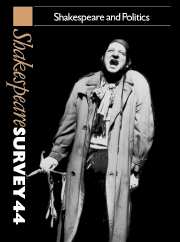Book contents
- Frontmatter
- Shakespeare and Politics
- Language, Politics, and Poverty in Shakespearian Drama
- Some Versions of Coup d’état, Rebellion and Revolution
- Woman, Language, and History in The Rape of Lucrece
- Love in Venice
- Two Kingdoms for Half-a-Crown
- ‘Fashion it thus’: Julius Caesar and the Politics of Theatrical Representation
- ’Demystifying the Mystery of State’: King Lear and the World Upside Down
- Tragedy, King Lear, and the Politics of the Heart
- The Politics of Shakespeare Production
- Shakespeare in the Trenches
- Shakespeare’s Earliest Editor, Ralph Crane
- Shakespeare’s Falconry
- Telling the Story of Shakespeare’s Playhouse World
- Shakespeare Performances in England, 1989–90
- Professional Shakespeare Productions in the British Isles January-December 1989
- Critical Studies
- Shakespeare’s Life, Times, and Stage
- Editions and Textual Studies
- Books Received
- Index
‘Fashion it thus’: Julius Caesar and the Politics of Theatrical Representation
Published online by Cambridge University Press: 28 March 2007
- Frontmatter
- Shakespeare and Politics
- Language, Politics, and Poverty in Shakespearian Drama
- Some Versions of Coup d’état, Rebellion and Revolution
- Woman, Language, and History in The Rape of Lucrece
- Love in Venice
- Two Kingdoms for Half-a-Crown
- ‘Fashion it thus’: Julius Caesar and the Politics of Theatrical Representation
- ’Demystifying the Mystery of State’: King Lear and the World Upside Down
- Tragedy, King Lear, and the Politics of the Heart
- The Politics of Shakespeare Production
- Shakespeare in the Trenches
- Shakespeare’s Earliest Editor, Ralph Crane
- Shakespeare’s Falconry
- Telling the Story of Shakespeare’s Playhouse World
- Shakespeare Performances in England, 1989–90
- Professional Shakespeare Productions in the British Isles January-December 1989
- Critical Studies
- Shakespeare’s Life, Times, and Stage
- Editions and Textual Studies
- Books Received
- Index
Summary
In David Zucker's 1988 film of The Naked Gun, a hapless Los Angeles Chief of Police, Lieutenant Frank Drebin, is warned by his relatively pacifist Mayoress employer to curb his propensity for violence. Drebin, himself an exaggerated post-modernist collocation of easily recognizable film texts, counters with a policy statement of his own sufficient to rival any pronouncement of Clint Eastwood's Dirty Harry:
Yes, well when I see five weirdos dressed in togas stabbing a guy in the middle of the park in full view of a hundred people, I shoot the bastards. That's my policy.
The response of his outraged employer is the embarrassed revelation that: 'That was a Shakespeare in the park production of Julius Caesar you moron. You killed five actors: good ones.' The choice of the assassination scene from Julius Caesar to illustrate the violence necessary to redress an alleged crime echoes parodically one of two familiar critical readings of this Shakespearian text. In Zucker's film the comic extolling of Caesarism through the wholly inept efficiency of a law enforcement officer unaware of his own representational status and also, at the same time, unable to distinguish other forms of representation, is reinforced by the reactionary nature of his task: the protection of a visiting English queen against the threat of assassination. The latter, ironically republican critical perspective is exemplified in Alex Cox's film Walker (1988) which utilizes a scene from Julius Caesar to explore, in the thinly veiled allegorical setting of nineteenth-century Nicaragua, the ironies and contradictions inherent in an imperialist project.
- Type
- Chapter
- Information
- Shakespeare Survey , pp. 65 - 74Publisher: Cambridge University PressPrint publication year: 1991

